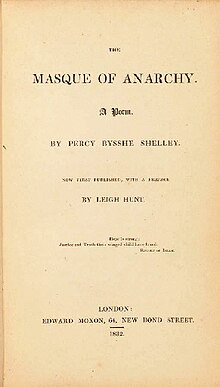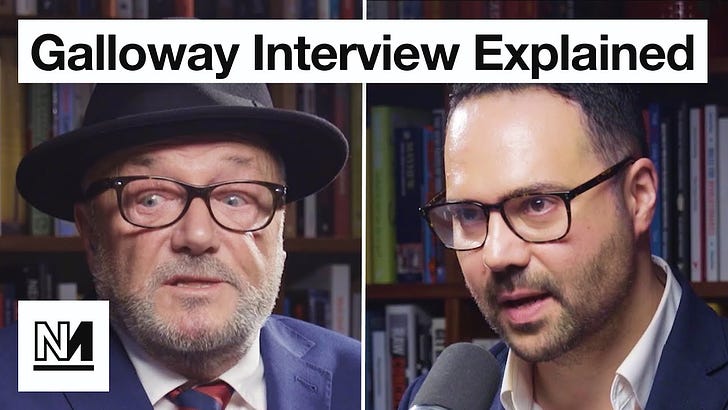https://thealtworld.com/alastair_crooke/the-beast-of-ideology-lifts-the-lid-on-transformation
The beast of ideology lifts the lid on transformation
MONDAY 6 MAY 24
126
Many of today’s Woke liberals however, would reject the allegation of being anti-free speech, labouring under the misapprehension that their liberalism is is not curtailing free speech, but rather is protecting it from ‘falsehoods’ emanating from the enemies of ‘our democracy’ (i.e. the ‘MAGA contingent’). In this way, they falsely perceive themselves as still adhering to the classical liberalism of, say, John Stuart Mill.
Whilst it is true that in On Liberty (1859) Mill argued that free speech must include the freedom to cause offence, in the same essay he also insisted that the value of freedom lay in its collective utility. He specified that “it must be utility in the largest sense – grounded on the permanent interests of man as a progressive being”.
Free speech has little value if it facilitates the discourse of the ‘deplorables’ or the so-called Right.
In other words, “Like many other 19th-century liberals”, Professor Gray argues, “Mill feared the rise of democratic government because he believed it meant empowering an ignorant and tyrannical majority. Time and again, he vilified the torpid masses who were content with traditional ways of living”. One can hear here, the precursor to Mrs Clinton’s utter disdain for the ‘deplorables’ living in ‘fly-over’ U.S. states.
Rousseau too, is often taken as an icon of ‘liberty’ and ‘individualism’ and widely admired. Yet here too, we have language which conceals its’ fundamentally anti-political character.
Rousseau saw human associations rather, as groups to be acted upon, so that all thinking and daily behaviour could be folded into the like-minded units of a unitary state.
The individualism of Rousseau’s thought, therefore, is no libertarian assertion of absolute rights of free speech against the all-consuming state. No raising of the ‘tri-colour’ against oppression.
https://en.m.wikipedia.org/wiki/Socialist_Party_of_Great_Britain
The sort of bloody revolution that introduced capitalism in one country after another is out of date. Four main factors now make it essential to work for a revolution that is peaceful, democratic and which uses the voting system in those countries which have it:
Most modern capitalist states are now so well-armed, so well informed and so wealthy and powerful that an armed insurrection trying to overthrow an established state machine would be doomed to failure.
When violence has been used to establish a regime, it can only be maintained by violence or the threat of it (like capitalism). A socialist society cannot be built upon such foundations.
There is no way of knowing, and showing, that such a violent revolutionary movement represents the wishes of the great majority. Many workers would oppose it simply because it was violent and destructive. Only a vote can prove that the majority insist upon the overthrow of capitalism.
A sufficiently massive majority vote makes violence unnecessary because it demonstrates that opposition would be pointless.
https://en.m.wikipedia.org/wiki/Socialist_Party_of_Great_Britain
Sofia
May 6, 2024 8:52 PM
I’m loving the spat between George Galloway and novara media both as bad as each other both supporters of lockdown, the “left” continues to eat itself.
5
-3
Reply
two people really talk these things through. This is as Cringeworthy as Sam Harris and Montbiot trying to have a dialogue with Noam Chomsky or In Defense of usury, Bentham’s attempted dialogue with Adam Smith. If nothing else this is an entertaining innovation on the Strawman approach to arguing with one’s self, The Monty Python Argument Sketch is the closest thing to it I can think of.
Harris same as Monbiot All about him Ego.( that’s only my opinion. I personally find Harris deeply annoying in the same degree that I find Niall Ferguson deeply annoying.)YMMV. Your Mileage may vary.
https://www.samharris.org/blog/item/the-limits-of-discourse
April 26, 2015
From: Sam Harris
To: Noam Chomsky
Noam — I reached out to you indirectly through Lawrence Krauss and Johann Hari and was planning to leave it at that, but a reader has now sent me a copy of an email exchange in which you were quite dismissive of the prospect of having a “debate” with me.
ZIzeck Peterson.
HegalIAN DIALECTIC AND KIERKEGAARD SELLS YOU A T-SHIRT
Sören Kierkegaard famously said, “once you Label me, you negate me “This is what Kierkegaard actually said or wrote, a closer paraphrase in any event.
Kierkegaard said: “I am no part of a whole, I am not integrated, not included. To put me in this whole you imagine is to negate me. Who am I? I am an intensity of feeling in relation with beings, and particularly with the Divine Being, who excites my desire, my knowledge. I want to be in a kind of self-destroying contact with God, the Absolute Other.”
Impossibilism is a Marxist theory that stresses the limited value of political, economic, and social reforms under capitalism. As a doctrine, impossibilism views the pursuit of such reforms as counterproductive to the goal of achieving socialism as they stabilize, and therefore strengthen, support for capitalism.
https://en.m.wikipedia.org › wiki
Impossibilism - Wikipedia
https://web.archive.org/web/20220703195127/https://notthegrubstreetjournal.com/2022/06/28/shelley-trumpet-of-prophecy-by-paul-foot/
All politics in those years were dominated by the French Revolution. Like many other great poets of his time—Wordsworth, Coleridge, Southey—Shelley was an enthusiastic supporter of the revolution. One by one, however, the others abandoned the revolution, and denounced it. Shelley was appalled by the Napoleonic dictatorship—and wrote a poem on Napoleon’s death that started: “I hated thee, fallen tyrant.” But he never lost his enthusiasm for the ideas which had given rise to the revolution. His long poem, The Revolt of Islam, though it contains irritatingly few specific ideas about revolutionary politics, is clear on one matter above all else: that in spite of the disease, the terror, the dictatorship, the wars, the poverty, and the ruin which followed the revolution, the ideas of reason and progress which inspired it will triumph once again. In his preface to the poem he poured scorn on those who gave up their belief in revolutionary ideas because the revolution had been defeated, or had not gone according to plan. The passage could just as well have been written about the generations of disillusioned communists after losing the Russian Revolution:
Left and right the two masques of “anarchy”
The Masque of Anarchy (or The Mask of Anarchy) is a British political poem written in 1819 (see 1819 in poetry) by Percy Bysshe Shelley following the Peterloo Massacre of that year. In his call for freedom, it is perhaps the first modern statement of the principle of nonviolent resistance.

I met Murder on the way –
He had a mask like Castlereagh –
Very smooth he looked, yet grim;
Seven blood-hounds followed him
In this ghastly masquerade,
All disguised, even to the eyes,
Like Bishops, lawyers, peers, or spies.
When between her and her foes
A mist, a light, an image rose,
Small at first, and weak and frail
Like the vapour of a vale:
With step as soft as wind it passed,
O’er the heads of men – so fast
That they knew the presence there,
And looked, – but all was empty air.
XXXI
As flowers beneath May’s footstep waken,
As stars from Night’s loose hair are shaken,
As waves arise when loud winds call,
Thoughts sprung where’er that step did fall.
XXXII
And the prostrate multitude
Looked – and ankle-deep in blood,
Hope, that maiden most serene,
Was walking with a quiet mien:
XXXIII
And Anarchy, the ghastly birth,
Lay dead earth upon the earth;
The Horse of Death tameless as wind
Fled, and with his hoofs did grind
To dust the murderers thronged behind.
XXXIV
A rushing light of clouds and splendour,
A sense awakening and yet tender
Was heard and felt – and at its close
These words of joy and fear arose
‘Men of England, heirs of Glory,
Heroes of unwritten story,
Nurslings of one mighty Mother,
Hopes of her, and one another;
XXXVIII
‘Rise like Lions after slumber
In unvanquishable number,
Shake your chains to earth like dew
Which in sleep had fallen on you –
Ye are many – they are few.’










